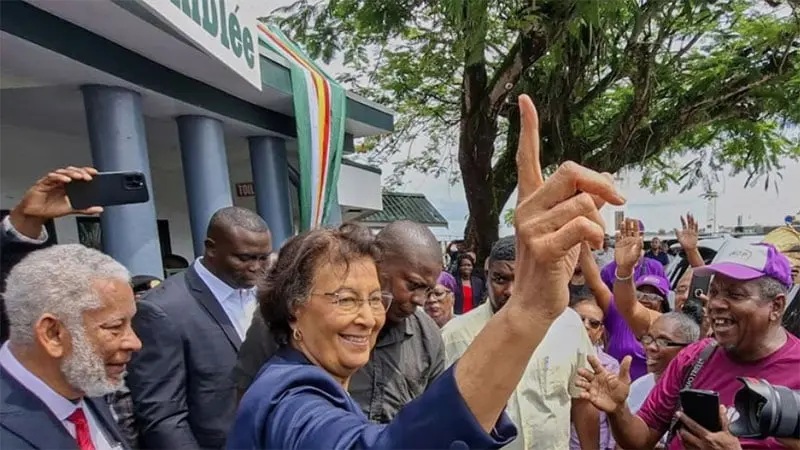Suriname has made history by electing Jennifer Geerlings-Simons as its first female president.
The 71-year-old physician and veteran lawmaker secured the presidency after receiving overwhelming backing from parliament, following a coalition agreement in the National Assembly.
Her unopposed election on Sunday marks a significant political shift for the South American nation as it grapples with economic challenges and widespread discontent.
Geerlings-Simons, who leads the National Democratic Party, will officially assume office on July 16, 2025.
Her confirmation comes on the heels of inconclusive elections in May and increasing calls for a change in leadership after a turbulent presidency under Chandrikapersad Santokhi.
Santokhi’s term was overshadowed by allegations of corruption and unpopular austerity measures that stabilized the macroeconomy with help from the International Monetary Fund (IMF).
The measures also sparked widespread protests due to sharp cuts in public subsidies.
Acknowledging the historic weight of her new role, Geerlings-Simons expressed both humility and determination following her confirmation.
“I am aware that the heavy task I have taken on is further aggravated by the fact that I am the first woman to serve the country in this position,” she stated.
She will be joined in office by Gregory Rusland, her vice-presidential running mate.
Together, they inherit a nation of 646,000 citizens struggling with inflation, reduced government spending, and persistent inequality.
The previous administration achieved some fiscal gains by restructuring external debt and regaining international lender confidence.
On the other hand, the social costs have been severe, leaving many citizens disillusioned and angry.
Looking ahead, Geerlings-Simons has pledged to focus on financial reform and improved revenue collection.
One of her key policy goals is to tighten tax enforcement, particularly targeting small-scale gold mining operations, a significant but under-regulated source of national income.
With Suriname projected to begin offshore oil production in 2028, she also aims to lay the groundwork for managing and distributing the anticipated oil revenue more equitably and transparently.
Economists, however, warn that immediate challenges will overshadow long-term ambitions.
Winston Ramautarsingh, former president of the Surinamese Economists’ Association, cautioned that the country still faces a steep financial cliff.
“Suriname must repay roughly $400 million annually in debt servicing,” he said.
“The prior administration restructured much of that debt, but that simply delayed the reckoning.
“The money still isn’t there.”
Indeed, the country’s economic instability remains deeply entrenched, even as hopes rise for an oil-driven recovery.
Geerlings-Simons must now navigate a delicate political and fiscal landscape, balancing urgent public demands for relief with international financial obligations.
Her presidency also arrives as Suriname prepares to commemorate its 50th anniversary of independence from the Netherlands this November.
For many, the milestone serves as a symbolic moment to reset national priorities and restore public faith in governance.
Suriname’s future is also increasingly tied to global players.
In 2019, it became one of the first Latin American countries to join China’s Belt and Road Initiative, a move that has since deepened economic ties between the two nations.
As part of the vast infrastructure and investment program, Suriname has received support in the form of loans and development projects, although critics warn of long-term dependency and debt risks.
Despite its wealth of natural resources, including oil, gold, and timber, Suriname remains one of the poorest countries in South America.
Its small population reflects a remarkable diversity, made up of African descendants, Indigenous peoples, East Indians, Indonesians, Chinese, and European settlers.
This cultural mosaic, while a source of national pride, also presents governance challenges in terms of equitable development and political representation.
Geerlings-Simons’ election has been hailed as a landmark moment for women in Suriname and across the region.
Her rise to power comes after decades of political experience and service in the National Assembly, where she built a reputation for resilience and negotiation.
As she prepares to take the helm, her leadership will be closely watched, both for how she manages the fragile economy and for whether she can deliver on her promise of a more just and prosperous future.







